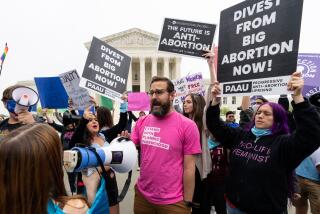Judge Tells U.S. to Pay Fees to Legal Aid Firms : Government: He says Health and Human Services acted in bad faith in denying disability payments to thousands. Organizations recovered millions for low-income clients.
A federal judge in Los Angeles has ordered the U.S. Department of Health and Human Services to pay $1.7 million in fees to 10 legal aid organizations that helped low-income clients collect hundreds of millions of dollars in Social Security disability benefits denied them by the Reagan Administration.
Poverty law experts said it is the largest legal-fee award ever granted under the Equal Access to Justice Act, which was enacted in the early 1980s to make it easier for citizens to challenge unjust government action.
U.S. District Judge William P. Gray, in a decision released Friday, said one reason he granted such fees was that the government had acted in “bad faith” during the lengthy class-action case, which began in 1982.
Starting in 1981, the Reagan Administration decided to make widespread purges of federal disability rolls in an attempt to save money, according to testimony at congressional hearings and numerous court cases.
By October, 1983, 375,000 people nationwide had lost their disability benefits and the number of applications dropped sharply as potential recipients became discouraged.
The policy was so controversial that governors of more than half a dozen states, from Kansas to Massachusetts, told state welfare officials not to follow new federal regulations that mandated disqualification of large numbers of recipients.
In two early cases, federal judges in the West ruled that the government had illegally cut off Social Security benefits of people who said they suffered disabilities ranging from blindness to mental illness. The judges said that the government could not cut off recipients unless there was a clear showing that their conditions had improved and that they were no longer disabled.
Margaret Heckler, then secretary of Health and Human Services, said she would not acquiesce to the court decisions and ordered administrative law judges working under her to ignore them.
Poverty lawyers filed a class-action suit in Los Angeles to compel Heckler to comply with the federal court decisions. The government put up stern resistance, seeking to litigate disability denials on a case-by-case basis.
Early in the case, a Social Security Administration official said reinstatement of all people cut from the rolls would cost the agency $20 million a month in the nine Western states alone, not counting retroactive payments they might be owed.
In June, 1983, Judge Gray issued an injunction against Heckler’s department, ordering it not to cut off recipients unless it could show that they were no longer disabled. The judge declared that Heckler was trying “to operate outside the law.”
Gray’s order meant that 41,000 people in the nine Western states, including California, were eligible for reinstatement and required reviews of their cases to determine if they were entitled to retroactive benefits.
Further complicating the case, Supreme Court Justice William H. Rehnquist three months later stayed the judge’s order. But Congress enacted legislation that, in essence, upheld Gray’s decision.
Nonetheless, cases dragged on for years because the government was reluctant to comply, according to Los Angeles legal aid lawyer Elena H. Ackel, the lead attorney in the case. She said Friday that she still is litigating on behalf of 25 people “to get them what Judge Gray and the Congress said they are entitled to.”
Ackel said the vast majority of individuals who applied won retroactive benefits, generally ranging from $10,000 to $80,000.
Several people were able to buy homes with the money, she said, but a greater number lost homes as a result of being denied disability benefits.
Similar class-action suits were won on behalf of beneficiaries in other parts of the country.
Although aspects of the suit will drag on for a while, the plaintiffs’ lawyers decided to apply for fees earlier this year as Gray’s retirement became imminent. Among the organizations that will receive some of the $1.7 million are the Legal Aid Foundation of Los Angeles and the National Senior Citizens Law Center.
“You couldn’t ask for a judge who gave you more consideration for your clients,” Ackel said of the 76-year-old Gray. “He understood how grievous the wrong done to these people was.”
Richard Rothschild of the Western Center on Law and Poverty, said he hoped “the finding of ‘bad faith’ ensures that this will never happen again.”
A spokesman for the Social Security Administration, which falls under the Department of Health and Human Services, said government lawyers had not received Gray’s order and would not comment.
More to Read
Sign up for Essential California
The most important California stories and recommendations in your inbox every morning.
You may occasionally receive promotional content from the Los Angeles Times.









